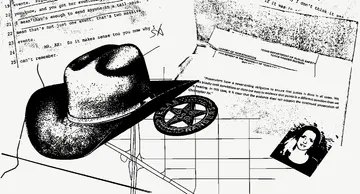Corey Williams was not your average 16-year-old boy growing up in Shreveport, Louisiana, in the 1990s. He drooled. He frequently urinated on himself and could not always manage to use the toilet properly. He sucked his thumb. He was unable to function properly at school, when he even made it to class, and was considered “mentally retarded,” as officials then phrased it. He “regularly ate dirt, paper, [and] lead paint chips,” an expert concluded years later in what she called “the most extreme case of lead poisoning that I have ever seen.” Williams’ IQ around this age was 65, marking him as “intellectually disabled” under the test the U.S. Supreme Court has long used.
Williams’ disability made him a target of cruelty and manipulation by some of the people in his life. Boys his age teased him. His classmates were mean to him. And so were many of the adults in his life. In January 1998, just three weeks after his 16th birthday, Williams found himself in the wrong place at the wrong time. He was standing in front of a house with a group of older men one evening when someone shot and killed a pizza delivery man who had driven to the house to complete an order. After the murder, Williams ran to his grandmother’s house and was found hiding under a sheet on the couch.
Williams first told the police that the older men had committed the murder. He also told them that those other men had told him, Williams, that they would kill him if he told the cops the truth about what had happened to the delivery man. But the police didn’t take yes for an answer. By the next morning, after a night of police interrogation with no attorney present, the boy with the 65 IQ had changed his tune. He told the cops that he had shot the victim. But even then the story he told was inconsistent with many of the details about the crime the police had uncovered. When Williams was done “confessing,” he told the officers: “I’m tired. I’m ready to go home and lay down.”
That was 20 years ago. Williams was convicted of murder and sentenced to death following a trial orchestrated by Hugo Holland, one of the state’s most notorious prosecutors. We’ve learned since then not just the extent of Williams’ disability but also how prosecutors manipulated the truth to convict him. Williams is no longer eligible for the death penalty-- both his age at the time of the crime and his mental condition preclude that-- but his case now is before the U.S. Supreme Court and it presents one of those rare instances where the injustice is so evident the justices may reverse Williams’ conviction outright without an oral argument.
In the murder investigation and prosecution that took place in Caddo Parish in 1998, nothing was as it seemed to be. There was no physical evidence linking Williams to the murder and there was no motive, either. Key witnesses interviewed by the cops in the wake of the crime all exonerated Williams and implicated three of the older men who were at that house when Jarvis Griffin, the victim, drove up to deliver his pizzas. But none of those men were ever charged with capital murder and only one of them has ever served time for the crime.
Griffin’s blood was found on the sweatshirt of a man named Gabriel Logan, and Griffin’s undelivered pizza boxes, and money, were found near Gabriel Logan’s home. The murder weapon was found near there as well. Witnesses initially told the police that Logan had robbed Griffin and that he, his brother Nathan Logan, and a man named Chris “Rapist” Moore had split the pizza money and hidden the .25 caliber gun used to kill Griffin. Nathan Logan, whose fingerprints were found on the murder weapon, told the police that he believed his own brother, Gabriel, had committed the murder and that Moore had set the whole thing up. None of these men ever faced the death sentence that eventually was handed down to Williams.
Many of these same witnesses at the same time gave statements that exonerated Williams. Nathan Logan, who incriminated his own brother, told the police that Williams could not have been the shooter. Another witness told police that he had seen Nathan Logan that evening give Moore the gun that ultimately was used to kill Griffin. Williams was nowhere to be seen when this happened. Police investigators even went on record as saying they believed the older men had committed the murder and that Williams was innocent. Other witnesses told the cops what Williams initially had told them: that Moore and the Logans had threatened them to change their stories.
Only Moore undermined the narrative. Facing a potential murder rap, with all the allegations against him, he chose to blame Williams for the robbery and murder and, inexplicably, police and prosecutors chose to believe him and ignore the rest of what they knew. They built their case at trial entirely on Moore’s testimony and Williams’ “confession” (which today would never withstand judicial review given what we know about the links between teenagers, intellectual disabilities, and false confessions). We may never know why Louisiana officials made this choice. And we’ll never know what jurors would have done had they been told the truth about Moore and the Logans.
Which brings us to the issue that is central to Williams’ pending petition to have the case reviewed by the high court. Before Williams’ trial his attorneys asked prosecutors for recordIngs of police interviews of the witnesses. It was a standard request and prosecutors had an obligation to respond to it under the principle set forth by the Supreme Court 55 years ago in a case styled Brady v. Maryland. But Caddo Parish prosecutors refused to do so. Instead, they gave the defense team “summaries” of the interviews. That’s standard practice in the state. The summaries Williams’ attorneys received from Caddo Parish prosecutors were misleading. They falsely incriminated Williams and exonerated Moore and the Logans.
Whereas Nathan Logan, for example, had told the police that his brother Gabriel “had to do it” and that Moore had “set it up,” the defense prior to trial was given a summary by prosecutors that indicated that Nathan Logan had told the police that Williams had committed the murder. Missing entirely from the documents given to Williams’ lawyers were the statements witnesses made to the police about the pressure Moore and the Logans had put on witnesses to perjure themselves. And to add insult to injury, at trial the prosecutor, knowing what he was hiding from Williams’ lawyers, mocked in closing arguments the defense theory that Moore and the Logans were the culprits.
He told told jurors:
… frankly, if you want to get down to it, what you have to believe to buy into this theory that Nathan and Gabriel and Chris framed Corey Williams, and let’s face it, Nathan and Chris didn’t sound too smart, has to be the biggest conspiracy or the biggest set of coincidental circumstances to bring an unfortunate man to trial, the biggest set of circumstances concerning a conspiracy since John Kennedy was killed in 1963...
Prosecutors justified their decision to provide these dubious summaries, and not the actual recordings or texts of the interviews, by claiming that the statements were not “material” to Williams’ defense. They based that argument on the fact that Williams had “confessed” to the crime and that his confession was so significant none of the rest of the evidence would have mattered. Prosecutors made this argument, and the courts of Louisiana accepted it, for years after Williams’ intellectual disability was proven in court in 2004. In other words, these judges used a “confession” made by an intellectually disabled 16-year-old to justify the decision by trial prosecutors to keep relevant evidence from defense attorneys and jurors.
The Williams case thus presents to the justices what likely will be an irresistible constellation of issues. You have the question of prosecutorial misconduct merged with the issue of a police interrogation of an intellectually disabled teenager. Which means you have the issue of a potentially false confession. You also have the question of the misapplication of the “Brady Rule” of pretrial discovery merged with Louisiana’s dubious reliance on malleable “summaries” of testimony. And you have it all taking place in Caddo Parish, during the reign of Hugo Holland, a prosecutor known for taking shortcuts in pursuing the death penalty.
Little wonder, then, that 44 former prosecutors and Justice Department officials, including many conservative experts, weighed in earlier this month on Williams’ behalf. Little wonder that Louisiana officials haven’t bothered yet to respond to the petition Williams’ lawyers have filed. Little wonder that Williams’ attorneys say their client’s time in prison has been a particularly miserable experience, a time where other inmates, and sometimes guards, continue to prey on him. And it would be no surprise if the justices decide to put an end to his misery sooner rather than later.

